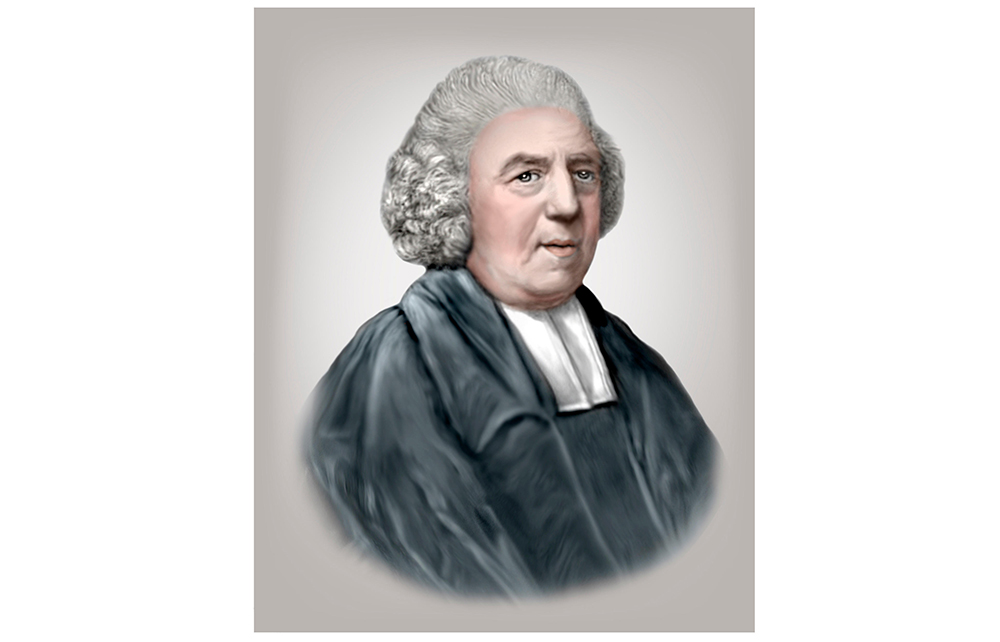Type ‘Amazing Grace’ into YouTube and you can cancel any other plans you might have had for the day. Page after page serves up everything from Elvis Presley to Pavarotti, Gospel choirs and winsome Celtic lovelies, folkies in fabulous knitwear and X Factor finalists strenuously proclaiming their surgically enhanced faith; even an American president. There are arrangements for electric guitar, steelpan orchestra, bagpipes or (God help us) beginner flute ensemble.
Saved from the storm, Newton was aware of ‘a sense of the amazing grace that snatched me from ruin’
All of which suggests that James Walvin’s Amazing Grace is a book landing in fertile soil. This is a song that’s part of western cultural furniture, ‘as familiar to most people’, he reminds us, ‘as the words of the national anthem’, as inevitable as ‘thoughts and prayers’, as universal as McDonald’s, all the while being endlessly customisable – oh and, crucially, free from any copyright obligation.
In his introduction, Walvin wonders why. Of all the songs in all the world, why this one? It’s not a question he ever answers satisfactorily, though the ‘how’ is mapped out in often repetitious detail. A career academic and prolific author, Walvin is an expert on the history of slavery – the first clue to the story of a song which unfolds with plenty of built-in tensions and ironies. Do these amount to the paradox Walvin repeatedly claims? I’m not so sure.
There’s pleasure to discovering that the origins of a song one might have placed in the 19th-century American south actually lie in 18th-century Wapping, with one John Newton. An early life of ‘the most horrid impiety and profaneness’ (of which, alas, we hear too little) leads Newton to the docks – first press-ganged into the navy and later finding his métier as a crew member and later captain of Atlantic slave ships. A near-fatal shipwreck on 1 March 1748 ‘transformed his life and outlook’. Saved from the storm, Newton became aware of ‘a sense of the amazing grace that snatched me from ruin, that pardoned such enormous sins and preserved my life’.
But what Hollywood would elide into an overnight conversion was inconveniently protracted. For several years the successful Newton ‘failed to realise… that his redemption coexisted with his continuing trade in, and brutalising of, Africans’. Only after illness forced him on to land did he pursue Holy Orders, becoming the minister at the parish of Olney in Buckinghamshire and the author of the words to ‘Amazing Grace’ in its earliest form.
And this is where Walvin gets stuck. We must be ‘baffled’ and ‘perplexed’, he writes, to discover that piety and slavery could co-exist in this period, whether in individuals or systemically; that two slave-captains could meet of an evening to discuss theology; that Newton (who would later join Wilberforce in the campaign against slavery) could experience ‘divine communion’ on his voyages to Guinea while beneath the decks his human cargo suffered unimaginable horrors. While there’s a piquant tension to the origins of a hymn which would later become an anthem of the civil rights movement that ‘seems to belong to’ African-American culture and experience, the historical values of its birth are hardly news.
Walvin is on home turf when the hymn crosses the Atlantic in 1789. He exposes the curious difference between England, where the hymn was for centuries ‘sniffily dismissed’, and America, where it found not only its most famous tune but also its audience. He traces the interconnected history of American political activism, Christianity and the recording industry in promoting ‘Amazing Grace’, charting its growing momentum from the 1970s onwards, its various incarnations from Mahalia Jackson and Aretha Franklin to Arlo Guthrie and Judy Collins.
He pauses on flashpoints in the song’s cultural evolution from Christian hymn to a secular ‘anthem for humankind’, including 9/11, Covid (when an Anglican vicar cycled around west London broadcasting it on loudspeakers), the 2021 Capitol riot (when protestors used it as a ‘musical fig leaf’), and of course Barack Obama’s much publicised but far from spontaneous performance of it during his speech after the Charleston church shooting.
But Walvin is surprisingly uninterested in the song’s melody. We’re almost a third of the way through the book before he mentions it, acknowledging that the tune we know today was not that originally associated with Newton’s verse at Olney. The origins of ‘New Britain’ (as the melody is known) are ‘elusive’, with possible claims on Irish or Scottish folk roots. Walvin leaves it at that.
What explains the ‘gravitational pull’ of ‘Amazing Grace’? For Walvin it’s Newton’s words, ‘a human quality that cuts across [a] religious divide’, a universal hope of ‘something better ahead’. That may be true, but hundreds of instrumental accounts, and instinct itself, argue that it’s not the entire story. If I’m Sorry I Haven’t a Clue has taught us anything, it’s that one song to the tune of another can instantly turn pathos into farce and beauty into disorder. A rose by any other name is one thing,but a song to any other melody just doesn’t sound as sweet.






Comments